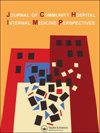Third-Degree Heart Block in COVID-19 Pneumonia Complicated by Methicillin- Resistant Staphylococcus Aureus (MRSA) Bacteremia. A case report and review of literature
IF 0.9
Q3 MEDICINE, GENERAL & INTERNAL
Journal of Community Hospital Internal Medicine Perspectives
Pub Date : 2023-11-04
DOI:10.55729/2000-9666.1269
引用次数: 0
Abstract
Coronavirus disease 2019 (COVID-19) burden has been identified to cause multiorgan damage. Respiratory compromise is still one of the most common presentations, but cardiac injuries like myocardial injury, ischemia, and conduction abnormalities are also becoming prevalent. We present a case of an 87-year-old male with a history of dementia, type 2 diabetes mellitus, hypertension, chronic kidney disease, and a left kidney transplant hospitalized for respiratory distress and generalized tonic-clonic seizures. He was bradycardic to 27 beats per minute, hypotensive with mean arterial pressure(EKG) depicted a high-grade atrioventricular block (AV-block). The transvenous pacemaker was placed via femoral access and tested positive for COVID-19. Work-up was done to rule out possible causes of bradycardia, like hypothyroidism, ischemia, AV nodal blocking agents, and drug-induced bradycardia was negative. His hospital stay got complicated by methicillin-resistant staphylococcus aureus (MRSA) pneumonia leading to empyema and bacteremia. Unfortunately, being critically ill, the family opted for comfort measures, and he passed away. Our clinical vignette signifies cardiovascular complications in COVID-19 patients are associated with poor outcomes if not addressed. The conduction abnormalities in patients with intact cardiac structure and function are becoming more common in the setting of COVID infection. Assessment with serial EKGs and cardiac monitoring might be essential as patients can develop AV blocks at any point of the disease.COVID-19肺炎并发耐甲氧西林金黄色葡萄球菌(MRSA)菌血症的三度心脏传导阻滞病例报告及文献复习
2019冠状病毒病(COVID-19)负担已被确定可导致多器官损伤。呼吸损害仍然是最常见的表现之一,但心脏损伤如心肌损伤、缺血和传导异常也变得普遍。我们报告一位87岁男性患者,有痴呆、2型糖尿病、高血压、慢性肾脏疾病和左肾移植病史,因呼吸窘迫和全身性强直阵挛发作住院治疗。他心动过缓至每分钟27次,平均动脉压(EKG)低血压,表现为高度房室传导阻滞(av -传导阻滞)。经静脉起搏器经股骨通道放置,检测COVID-19阳性。检查排除心动过缓的可能原因,如甲状腺功能减退、缺血、房室结阻滞剂,药物性心动过缓阴性。他的住院期间因耐甲氧西林金黄色葡萄球菌(MRSA)肺炎而导致脓胸和菌血症。不幸的是,由于病危,家人选择了安慰措施,他去世了。我们的临床小插曲表明,如果不加以解决,COVID-19患者的心血管并发症与不良预后相关。在心脏结构和功能完好的患者中,传导异常在新冠肺炎感染中越来越常见。由于患者在疾病的任何阶段都可能出现房室传导阻滞,因此通过连续心电图和心脏监测进行评估可能是必要的。
本文章由计算机程序翻译,如有差异,请以英文原文为准。
求助全文
约1分钟内获得全文
求助全文
来源期刊

Journal of Community Hospital Internal Medicine Perspectives
MEDICINE, GENERAL & INTERNAL-
自引率
0.00%
发文量
106
审稿时长
17 weeks
期刊介绍:
JCHIMP provides: up-to-date information in the field of Internal Medicine to community hospital medical professionals a platform for clinical faculty, residents, and medical students to publish research relevant to community hospital programs. Manuscripts that explore aspects of medicine at community hospitals welcome, including but not limited to: the best practices of community academic programs community hospital-based research opinion and insight from community hospital leadership and faculty the scholarly work of residents and medical students affiliated with community hospitals.
 求助内容:
求助内容: 应助结果提醒方式:
应助结果提醒方式:


